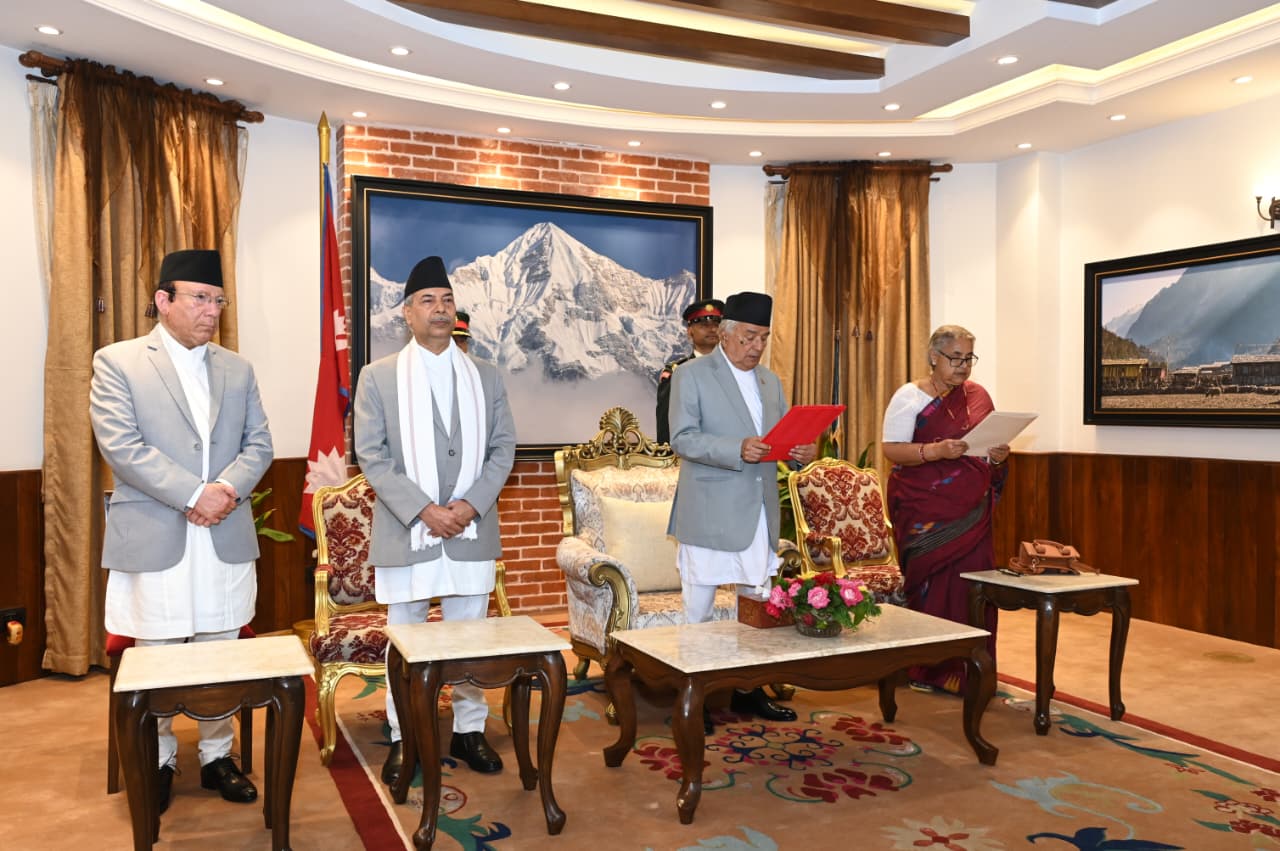
SATV Kathmandu Sept 13: Former Chief Justice Sushila Karki has been appointed as Prime Minister of the interim government after major political parties and representatives of the Gen Z protest movement reached a breakthrough agreement on Friday evening.
President Ram Chandra Paudel administered her oath of office and secrecy amidst a special function held at the Office of the President in Sheetal Niwas.
Karki was appointed as prime minister of the interim government as per Article 61 (4) of the constitution. Her appointment came as a part of the deal reached with the Gen Z representatives that included the dissolution of the current parliament. The Article 61(4) mentions that the main duty of the President shall be to abide by and protect the constitution. A statement issued by the President’s Office mentions that the current parliament has been dissolved with immediate effect from 11 PM, Friday, September 12.
Friday’s oath-taking ceremony of the Prime Minister at Sheetal Niwas presented an unusual scene. Traditionally, such events see a strong presence of caretaker prime ministers, former prime ministers, and political party leaders, but this time was markedly different.
At the ceremony for newly appointed Prime Minister Sushila Karki, outgoing Prime Minister KP Sharma Oli, the Speaker of the House of Representatives, the Chairperson of the National Assembly, former prime ministers, and leaders of major political parties were all absent. Their absence likely signaled widespread dissatisfaction with Karki’s appointment and the dissolution of the House of Representatives.
Even a prominent supporter of the Gen-Z movement, Kathmandu Mayor Balen Shah did not attend.
After the oath-taking, the President congratulated the newly appointed Prime Minister, saying, “Heartiest congratulations and best wishes. May you succeed, and may the nation thrive.”
President Paudel has entrusted newly-appointed Prime Minister Karki with the responsibility of conducting elections for the House of Representatives within the next six months. According to the President’s office, Karki’s appointment aims to address the current extraordinary political situation and reflects consultations with political parties and stakeholders, as well as the aspirations of the country’s younger generation.
The letter appointing Karki as Prime Minister includes a mandate to hold elections within six months. Under this mandate, Karki is to hold elections on March 5.
Mainstream political parties had earlier opposed dissolving the parliament, although they were positive about giving Gen Z youths to form the new government. The stance of the mainstream parties not to dissolve the parliament had delayed breakthrough in the talks after Gen Z group made parliament dissolution their bottom line.
Prime Minister Karki is expected to induct new members in her cabinet on Saturday.
Karki’s appointment as leader of the interim government comes after Prime Minister K P Sharma Oli was forced to step down on Tuesday following the widespread anti-corruption protests in Kathmandu Valley and elsewhere in the country. With this appointment, Karki has become the first woman to lead the country's government, taking office amidst a period of political instability and unrest.
Karki is a prominent figure in Nepal's legal and political history. Born in Shankarpur, she began her legal career in 1979 after earning a law degree from Banaras Hindu University, India. She gained recognition for her integrity and commitment to justice, particularly during her tenure as Nepal's first female Chief Justice from July 2016 to June 2017.
Karki was appointed as a Justice of the Supreme Court in January 2009, with her position becoming permanent the following year. Following the retirement of Chief Justice Kalyan Shrestha in April 2016, Karki was recommended by the Constitutional Council to succeed him. During her tenure, she was known for her strict stance against corruption and her landmark decisions on transitional justice and electoral disputes.
Karki, who served as Nepal’s first female Chief Justice and is widely regarded for her integrity, emerged as a consensus candidate after heated negotiations. For the Gen Z representatives, her appointment symbolizes a break from entrenched political elites, while traditional parties see her as a neutral figure capable of steering the country through the crisis.
Because of her strong stance against corruption, an impeachment motion was filed against Karki in Parliament in 2017 by the ruling parties, accusing her of bias and interfering with executive powers. The motion was viewed by many as politically motivated, aiming to thwart her verdicts on high-profile cases.
Under public pressure and an interim Supreme Court order barring Parliament from proceeding, the impeachment motion was withdrawn. However, Karki resigned on June 6, 2017, upon reaching the mandatory retirement age of 65.



















